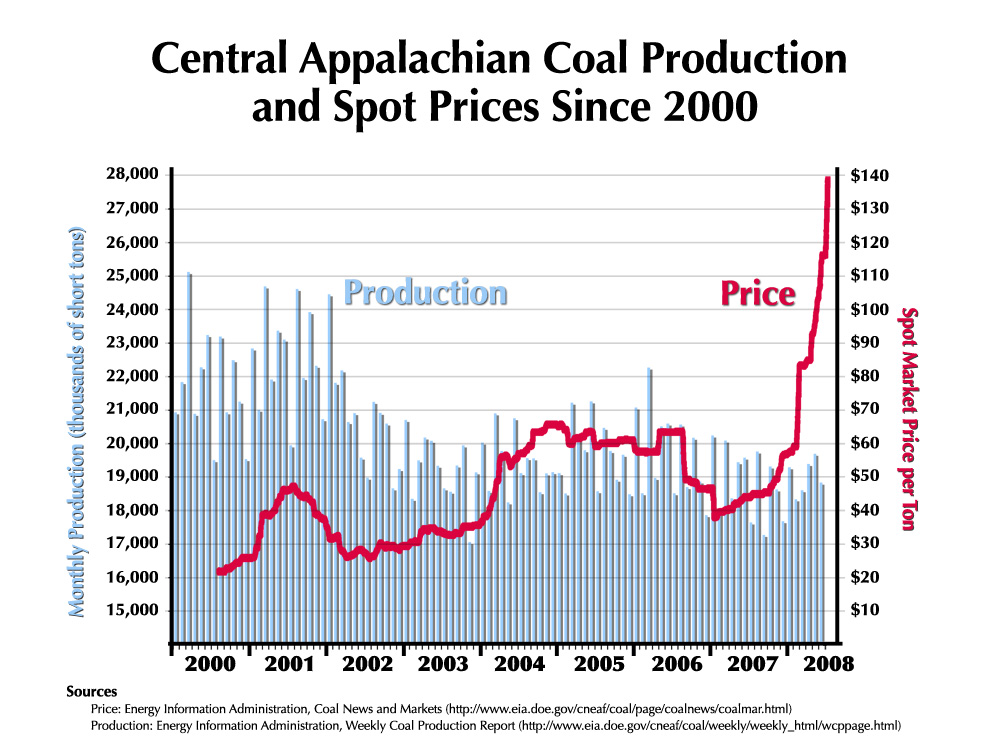
Jim Rogers, CEO of Duke Energy
After the Washington Post reported that President-elect Obama was considering Duke Power CEO Jim Rogers for Secretary of Energy, my soaring hopes for Obama’s promise to create “change we can believe in” swiftly turned to despairing thoughts of “change we can grieve in.”
Appointing Mr. Rogers to head the nation’s Department of Energy is like to placing the proverbial fox in charge of the hen house.
As one of the nation’s leading energy executives, Mr. Rogers is an integral part of what one colleague describes as the “coaligarchy” – shorthand for the coal-based electricity industry’s iron-fisted grip on, and historic devastation of, the people, communities and ecosystems wherever coal is mined, processed, burned and disposed of as air pollution and other hazardous post-combustion waste.
Publicly, Mr. Rogers’ waxes poetic about our need to address global climate change and Duke Energy Carolinas has made much ado about building one of the nation’s largest solar energy projects in North Carolina. Yet, his deeds – and those of his company – belie the fact that these statements and actions are little more than a “green” facade hiding the fact that Mr. Rogers, his company and their ilk are hell-bent on building costly and unnecessary coal and nuclear power plants.

The mountaintop removal coal mines
providing coal to Duke Power’s
Cliffside Power Plant
I live in North Carolina – a state with too many Duke power plants to count, located in a region ravaged by mountaintop removal coal mining. In fact, North Carolina is second only to Georgia in its consumption of mountaintop removal coal. If Mr. Rogers’ actions reflected his public statements about minimizing the impacts of coal-based energy, he would not have proposed to build two 800-megawatt coal-fired power plants in North Carolina and one in Indiana. While the N.C. Utilities Commission mercifully denied one of the two plants, Duke is feverishly constructing the other.
.jpg)
Duke Power’s Cliffside Power Plant,
the site of Duke’s new coal fired electricity generators
This plant is estimated to pump the air pollution-equivalent of one million additional cars into the atmosphere during each of its fifty-year lifespan. Moreover, while North Carolina is experiencing one of the worst droughts in its history, the new plant is expected to evaporate 21 million gallons of water per day for cooling. Worse, Duke manipulated the political process in order to ensure that its ratepayers – rather than shareholders – bear the financial risks of proceeding with this plant whether or not it’s ever completed! Worst of all, however, is the fact that the electricity from the new plant may be unnecessary for meeting alleged growing demand. According to the Raleigh News & Observer, Duke “appears to be lining up cities it hasn’t previously served to be future customers.”
As a Mea culpa for foisting this plant upon us, Mr. Rogers and Duke have made several promises to North Carolinians in exchange for their complicity in allowing Duke to move forward with new coal and nuclear power plants. First, Duke softened the blow of making ratepayers responsible for financing the new coal plant by agreeing to a provision that it deploy some renewable sources of energy. In terms of addressing global climate change, the goal is no better than rearranging the deck chairs on the titanic.
Second, Mr. Rogers has promised that the new coal-fired power plant will be the last one built in the state. This promise rings hollow when one considers the fact that impending climate change legislation will likely require new power plants to capture, transport and store carbon dioxide. Because North Carolina has no viable storage sites, Duke would need to build a cost-prohibitive pipeline in order to move the captured carbon.
Third, Duke is seeking to implement an energy efficiency program euphemistically known as Save-A-Watt. Save-A-Watt has been lambasted as being too expensive and accomplishing too little. According to a Winston-Salem Journal editorial criticizing the program, Duke is seeking “a much higher return on the investment it makes trying not to sell us electricity than it is guaranteed for the investment it makes producing the electricity we use. … the principle is ridiculous. … The effort to save energy should be part of a utility’s normal course of business. Considering that utilities are guaranteed a profit on the costs of doing that business, the profit from trying to save electricity would have been in line with that for trying to sell it.”
Finally, Duke has ignored pleas from North Carolina residents to minimize the impacts of mountaintop removal coal mining – the most destructive form of surface mining which has transformed more than 470 mountain peaks into flat, eerily lifeless moonscapes and buried more than 1200 miles of streams in Appalachia. Duke glibly claims that it has no control over how coal is mined. However, if Bank of America, headquartered in North Carolina can do it, see https://environment.bankofamerica.com/articles/Energy/COAL_POLICY.pdf, so can Duke.
In sum, the evidence is clear. While Mr. Rogers speaks eloquently about cleaning up his industry, his actions as a prominent “coaligarch” reflect no compunction about the devastating impacts his industry has on the people, communities and ecosystems wherever coal is mined, processed, burned and disposed of as air pollution and other hazardous post-combustion waste.
As Mr. Obama repeatedly recognized during his campaign, America stands at a crossroads – facing a choice between a safe, clean energy future and business as usual. If Mr. Obama seeks “change we can believe in,” he must appoint a visionary and effective leader at the Department of Energy in order to create that change. Appointing a “coaligarch,” on the other hand, heralds change we should all grieve in.
Please join me in contacting the Obama transition team and request that he appoint a leader willing to create green jobs, not snow jobs.
 Yesterday was a historic day for our nation. And like millions of others across America, those of us here at iLoveMountains.org watched the inauguration with a mixture of hope for the future and awe at how far we’ve come.
Yesterday was a historic day for our nation. And like millions of others across America, those of us here at iLoveMountains.org watched the inauguration with a mixture of hope for the future and awe at how far we’ve come.





.jpg)


 Donna, a retired nurse, and Charlie, a member of the United Mine Workers of America, have successfully organized with their neighbors to keep valley fills and strip mine permits away from their home in Lenore, West Virginia for the past ten years. They have worked with other Mingo County residents to form a new citizens group,
Donna, a retired nurse, and Charlie, a member of the United Mine Workers of America, have successfully organized with their neighbors to keep valley fills and strip mine permits away from their home in Lenore, West Virginia for the past ten years. They have worked with other Mingo County residents to form a new citizens group, 




 If you are concerned about global warming, air and water pollution, or mountaintop removal coal mining, we need your help to push Duke Energy’s dirty coal plant “off the Cliffside”. Please request a new set of public hearings in your area about the dangers of mercury and air pollution from the proposed Cliffside coal-fired power plant near Charlotte, NC.
If you are concerned about global warming, air and water pollution, or mountaintop removal coal mining, we need your help to push Duke Energy’s dirty coal plant “off the Cliffside”. Please request a new set of public hearings in your area about the dangers of mercury and air pollution from the proposed Cliffside coal-fired power plant near Charlotte, NC.


 Man, the iLoveMountains.org
Man, the iLoveMountains.org 